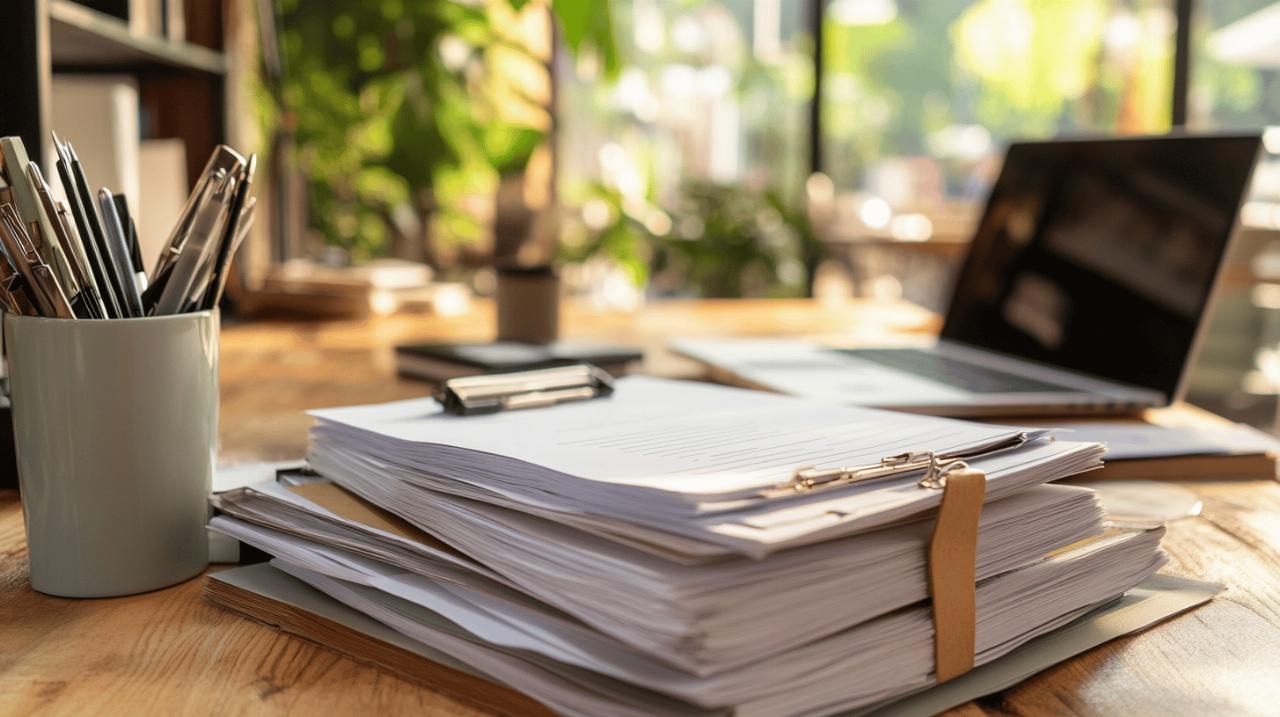Opening a restaurant in the UK involves navigating a complex web of legal requirements, licences, and safety certifications. Whether you're a first-time restaurateur or expanding your culinary empire, understanding these essential documents—or 'les pieces justificatives' as they're sometimes called in the industry—is crucial to ensure your establishment operates legally and safely.
Getting your business foundations right
Before diving into the specific safety certificates required for your restaurant, it's essential to lay proper groundwork for your business. This means addressing fundamental aspects that will shape your establishment's future and ensure compliance with UK regulations.
Crafting a solid restaurant business plan
Your journey begins with a comprehensive business plan, essentially your roadmap to success. This document should outline your concept, target market, competitive analysis, and detailed financial projections. A thorough business plan helps you visualize your restaurant's trajectory and serves as a critical tool when approaching potential investors or lenders. Many restaurant ventures falter due to inadequate planning, so take time to research your market thoroughly and establish realistic budget expectations.
Choosing the Proper Legal Structure for Your Eatery
The legal structure you select for your restaurant has significant implications for taxation, personal liability, and future growth opportunities. You might operate as a sole trader, form a partnership, or establish a limited company. Each structure offers different advantages and responsibilities. Sole traders benefit from simplicity but assume complete liability. Partnerships allow cost-sharing but require clear agreements. Limited companies provide personal asset protection but involve more administrative requirements. Consulting with a business adviser or accountant can help determine the most suitable structure for your specific circumstances.
Essential Licences and Certificates for Restaurant Owners
Running a restaurant in the UK requires obtaining various licences and certificates to demonstrate compliance with safety regulations and legal standards. These documents not only ensure you're operating lawfully but also protect your customers, staff, and business interests.
Alcohol licences and trading permits
If you plan to serve alcoholic beverages, you'll need to secure a premises licence from your local authority. This licence permits the sale of alcohol during specified hours and may include conditions regarding supervision and security measures. Additionally, at least one staff member must hold a personal licence, demonstrating their understanding of responsible alcohol service. Your restaurant might also require other permits depending on activities offered, such as live music or late-night food service. Early application is advisable, as processing these licences can take several weeks.
Gas Safety Certificates and EICRs: What You Need to Know
Gas Safety Certificates, specifically the CP42 for commercial properties, are mandatory legal requirements for any restaurant using gas appliances. These certificates verify that your gas equipment is safe and properly maintained. UK law mandates annual inspections conducted by Gas-Safe registered engineers, who thoroughly check for gas leaks, examine flues and chimneys, assess gas pressure, and identify any damaged components. The consequences of neglecting gas safety can be severe, with fines reaching up to £20,000 for non-compliance. Beyond financial penalties, unsafe gas appliances pose serious risks including carbon monoxide poisoning, explosions, and fires. The certificate must be renewed annually, though regulations allow for renewal within two months before the expiry date without losing any coverage time.
Equally important is the Electrical Installation Condition Report (EICR), which assesses the safety of your electrical systems. Although technically recommended every five years for rental properties, many insurance policies require current EICRs for commercial establishments. This inspection identifies potential electrical hazards that could lead to fires or injuries, providing peace of mind that your electrical infrastructure meets safety standards.
Food hygiene and safety requirements
Food safety forms the cornerstone of restaurant operations. Meeting stringent hygiene standards protects your customers from foodborne illnesses and safeguards your reputation in an industry where word-of-mouth can make or break your business.
Meeting hygiene regulations and obtaining certificates
All food businesses must register with their local authority at least 28 days before opening. Your premises will be subject to inspections by environmental health officers who assess compliance with food hygiene regulations. These inspections evaluate your food handling practices, cleanliness of facilities, and overall food safety management. The results contribute to your Food Hygiene Rating, displayed prominently to inform customers about your standards. Maintaining high scores requires consistent attention to cleaning schedules, proper food storage, temperature control, and cross-contamination prevention. Some local authorities also offer food hygiene courses that provide certification proving your knowledge of proper food handling practices.
Staff training and food safety management systems
Beyond physical safety measures, effective staff training forms an essential component of restaurant safety. Your team should receive comprehensive instruction on food handling, allergen awareness, and emergency procedures. This includes recognizing the signs of gas leaks, knowing how to respond to potential hazards, and understanding proper equipment operation. Staff should be familiar with emergency protocols, including safely turning off gas supplies, evacuation procedures, and contacting emergency services when necessary. A documented food safety management system based on HACCP principles helps maintain consistent standards and demonstrates your commitment to safety during inspections.
Premises and financial considerations
Securing suitable premises and managing finances wisely represent significant challenges for restaurant owners. Proper documentation and thorough planning in these areas help prevent costly surprises later.
Securing suitable premises with proper documentation
When leasing commercial space for your restaurant, ensure you have all necessary documentation regarding the property's condition and safety features. This includes verifying that ventilation systems meet industry standards, with properly maintained extractor fans and range hoods to prevent the buildup of potentially dangerous gases. The premises should have adequate safety features such as carbon monoxide detectors installed near gas appliances, which should be tested monthly with batteries replaced regularly. Your lease agreement should clearly outline responsibilities for maintenance and safety compliance between you and the landlord. Flame failure devices should be installed on all gas appliances to automatically cut off supply if flames extinguish unexpectedly, providing an essential safeguard against gas leaks.
Financial planning and projected turnover analysis
Financial planning extends beyond initial setup costs to include ongoing compliance expenses. Budget for regular safety inspections and certificate renewals, including the annual CP42 gas safety certificate, which ranges from approximately £160 for one appliance to £290 for four appliances. Consider that safety certificates represent a small investment compared to potential fines and liability issues. Factor these recurring costs into your business model alongside rent, staffing, and inventory expenses. Your financial projections should demonstrate sustainability while maintaining all necessary safety standards. Remember that cutting corners on safety compliance can result in significant financial penalties, with fines for gas safety violations alone reaching up to £20,000, not to mention the potential business interruption and reputational damage.
Understanding gas safety requirements for restaurants
When opening a restaurant in the UK, gas safety compliance is absolutely critical. All commercial properties, including restaurants and cafes, must adhere to the Gas Safety Regulations 1998. As a restaurant owner, you must ensure your premises meets all legal requirements to protect both staff and customers from potential hazards.
Gas safety falls under the responsibility of landlords for commercial properties. Failing to maintain proper gas safety standards can result in hefty fines—up to £6,000 for missing certificates, and even up to £20,000 in some cases. The Health and Safety Executive (HSE) provides strict guidelines that all restaurant owners must follow.
Annual inspections and cp42 compliance
UK law requires commercial properties with gas appliances to obtain a Commercial Gas Safety Certificate (CP42) every 12 months. This certificate confirms that all gas appliances, pipework, and flues in your restaurant have been thoroughly checked and are safe to use.
During the inspection, the engineer will check for gas leaks, damaged parts, assess flues and chimneys, and verify correct gas pressure. Any unsafe appliances will be marked as Immediately Dangerous (ID), At Risk (AR), or Not to Current Standards (NCS).
The Gas Safety (Installation and Use) (Amendment) Regulations 2018 permits renewal of certificates within the last two months before expiry, giving you some flexibility in scheduling. Once issued, landlords must provide tenants with a copy of the gas safety certificate within 28 days and keep records for at least two years.
The cost of CP42 certificates varies based on the number of appliances. Current pricing starts from £74, with specific rates of £159.99 for one appliance, £199.99 for two, £239.99 for three, and £289.99 for four appliances.
Working with gas-safe registered engineers
All gas safety inspections must be carried out by a gas-safe registered engineer. These professionals are qualified and legally permitted to work with gas appliances. When hiring an engineer, always verify their ID and qualifications on the Gas Safe Register website.
Beyond annual inspections, restaurants with high-volume kitchens might need more frequent checks. Regular maintenance helps prevent dangerous situations like gas leaks that could lead to fires, explosions, or carbon monoxide poisoning.
Your restaurant should implement additional safety measures, including carbon monoxide detectors near gas appliances. These should be tested monthly with batteries replaced regularly. Proper ventilation systems with extractor fans and range hoods are essential, and these systems must be kept clean and well-maintained.
All gas appliances should be fitted with flame failure devices (FFDs) that automatically cut off the gas supply if the flame goes out. Staff training is vital too—ensure all team members can recognise gas leaks, understand emergency procedures, and know how to use appliances correctly.
If you suspect a gas leak, there's a clear protocol to follow: turn off the gas supply if safe, evacuate the kitchen, avoid using electrical switches or open flames, and call the National Gas Emergency Service on 0800 111 999.
For assistance with gas safety certification, services like Gas Safety Certs (020 3011 2389, hello@gassafetycerts.com) or Landlord Safety Experts (020 8124 4522, info@landlordsafetyexperts.co.uk) can provide professional support for your restaurant's compliance needs.
